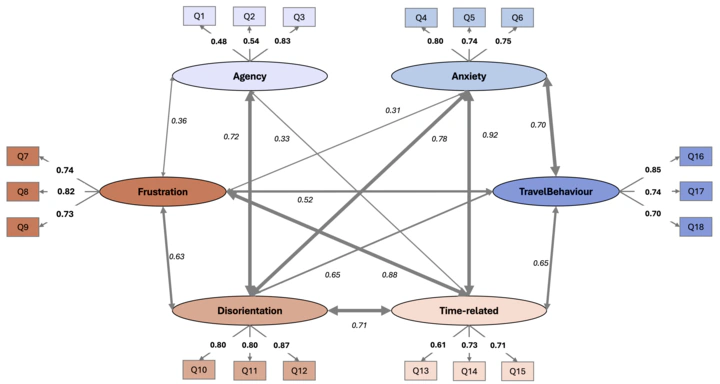EXID: Development and Validation of the Experienced Impact of Disruptions Scale
 Path diagram illustrating the relationships between scale factors (ellipses) and scale items (rectangles). Bold numbers indicate factor loadings between factors and items, while italicised numbers represent correlations between latent factors. Arrow thickness corresponds to the magnitude of the relationships, with thicker lines indicating stronger correlations.
Path diagram illustrating the relationships between scale factors (ellipses) and scale items (rectangles). Bold numbers indicate factor loadings between factors and items, while italicised numbers represent correlations between latent factors. Arrow thickness corresponds to the magnitude of the relationships, with thicker lines indicating stronger correlations.Abstract
Disruptions in public transport can significantly affect how travelers experience their journeys. While several attempts have been made to improve this experience, reliably measuring the experienced impact of disruptions remains a challenge. To address this gap, we developed and validated the EXperienced Impact of Disruptions Scale (EXID) scale, designed to capture the multifaceted nature of disruption experience from the traveler’s perspective. To construct and validate the scale, we followed a structured, multi-stage process. We first derived an initial pool of items based on prior literature, which were then refined through expert review (n = 3). We pre-tested the selected items through cognitive interviews (n = 5) and conducted an exploratory factor analysis on survey data (n = 350) to refine the scale and assess reliability. Based on a second survey (n = 209), we performed a confirmatory factor analysis and evaluated construct validity. Finally, test-retest validity was assessed with a third sample (n = 22). The analysis revealed six interrelated but conceptually distinct factors that constitute the experienced impact of disruption: agency, anxiety, frustration, disorientation, time-related stress, and travel behavior change. These factors reflect the complex and interconnected nature of travelers’ responses to disruptions. The EXID scale is suitable for both research and practice. It can be applied in real-time during a disruption, in retrospect, or for hypothetical travel disruption scenarios. Furthermore, it can be used to evaluate interventions aimed to improve the disruption experience, such as real-time information or alternative transport strategies. Ultimately, EXID provides a robust instrument to quantitatively measure a disruption’s impact on people’s experience and supports the design and evaluation of mitigation strategies in practice.